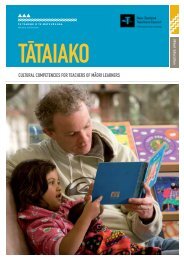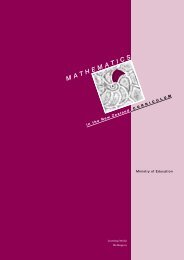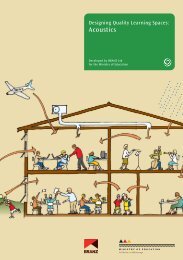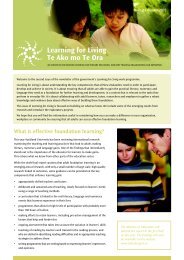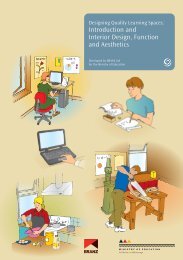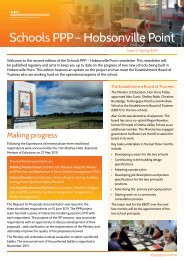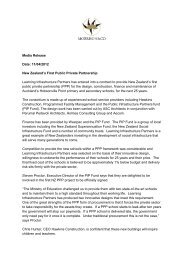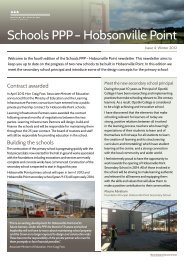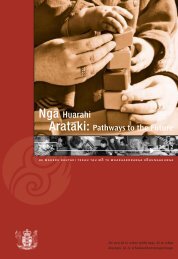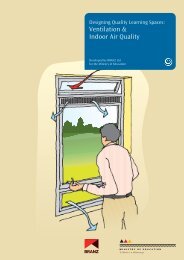values in the new zealand curriculum - Ministry of Education
values in the new zealand curriculum - Ministry of Education
values in the new zealand curriculum - Ministry of Education
You also want an ePaper? Increase the reach of your titles
YUMPU automatically turns print PDFs into web optimized ePapers that Google loves.
loss <strong>of</strong> Pasifika cultures. The follow<strong>in</strong>g sets <strong>of</strong> assumptions need to be cont<strong>in</strong>ually<br />
checked and critiqued when th<strong>in</strong>k<strong>in</strong>g about <strong>the</strong> contexts <strong>in</strong> which <strong>values</strong> <strong>of</strong> and about<br />
Pacific peoples are asserted:<br />
• Island identities may become lost by <strong>the</strong> fourth generation; what is actually<br />
be<strong>in</strong>g lost is a static, traditional culture embodied <strong>in</strong> grandparents who were<br />
born <strong>in</strong> <strong>the</strong> islands;<br />
• A formal education may supersede island <strong>values</strong> and beliefs;<br />
• New Zealand-born may take on <strong>values</strong> and beliefs <strong>of</strong> <strong>the</strong>ir non-Samoan<br />
cosmopolitan counterparts;<br />
• New Zealand-born may marry outside <strong>of</strong> <strong>the</strong>ir own ethnic group;<br />
• New Zealand-born may be totally <strong>in</strong>competent <strong>in</strong> <strong>the</strong>ir island tongue and thus<br />
opt out <strong>of</strong> island rituals;<br />
• New Zealand-born may have become upwardly mobile at <strong>the</strong> expense <strong>of</strong> <strong>the</strong>ir<br />
island cultures;<br />
• International movements erode <strong>the</strong> centeredness <strong>of</strong> an island identity; and<br />
• Geographical dispersal may break <strong>the</strong> bonds <strong>of</strong> a central geographic locality<br />
associated with belong<strong>in</strong>g (pp. 105-106).<br />
Anae provides counterpo<strong>in</strong>ts to <strong>the</strong>se assumptions. Specifically she argues that culture is<br />
an ongo<strong>in</strong>g dynamic, and does not stop at some fixed po<strong>in</strong>t <strong>in</strong> time or place. Change does<br />
not imply loss, ra<strong>the</strong>r a reformulation <strong>of</strong> identities set aga<strong>in</strong>st <strong>the</strong> impacts <strong>of</strong> <strong>the</strong> above<br />
changes and <strong>the</strong> history <strong>of</strong> colonialism, assimilation and/or homogenization <strong>of</strong> Pacific<br />
Islanders. The implications for <strong>the</strong> quality <strong>of</strong> education participation <strong>of</strong> Pacific peoples are<br />
that educators must be critically aware <strong>of</strong> <strong>the</strong>ir own cultural biases and how <strong>the</strong> New<br />
Zealand educational structures may enforce such homogeniz<strong>in</strong>g and alienat<strong>in</strong>g tendencies<br />
for Pacific learners. This is especially important as New Zealand born and raised Pacific<br />
learners <strong>in</strong> New Zealand schools are set to <strong>in</strong>crease over <strong>the</strong> next fifty years. Pasikale<br />
(1999, cited <strong>in</strong> Coxon et al., 2002) identified three identity pr<strong>of</strong>iles, based on <strong>the</strong> extent that<br />
Pacific youth identify with cultural traditions <strong>of</strong> <strong>the</strong>ir parents and grandparents as<br />
traditional, New Zealand blend, and New Zealand made. Her comments are crucial when<br />
consider<strong>in</strong>g how Pacific <strong>values</strong> can be <strong>in</strong>corporated <strong>in</strong>to educational practices and<br />
structures that are mean<strong>in</strong>gful for a grow<strong>in</strong>g range <strong>of</strong> Pasifika youth without reduc<strong>in</strong>g what<br />
Values <strong>in</strong> <strong>the</strong> New Zealand Curriculum: A Literature Review 35



